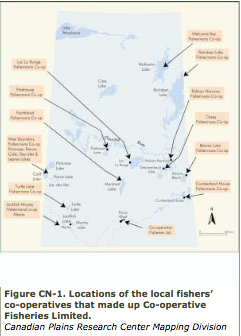
Many of the northern co-operatives grew out of two northern Crown Corporations formed in 1949: the Saskatchewan Fish Marketing Service, which purchased and marketed fish; and Saskatchewan Government Trading, which sold equipment and supplies to fishers. Whereas the Crown corporations succeeded in involving northern people in the commercial fishing industry, co-operatives were intended to involve them in business decision-making. So the two northern Crowns were transformed in 1959 into two convertible corporations. Initially placed under one government-appointed central board of southern co-operative leaders, they were intended to become true co-operatives as soon as the members were ready to own and operate them. The Saskatchewan Fish Marketing Service became Co-operative Fisheries Limited (CFL), initially with 12 local fishers’ co-operatives, fish processing plants, and other assets (see Figure CN-1). In 1966 the $225,000 debt to the provincial government for the assets transferred was repaid in full, and in 1971 CFL became a true co-operative.
Similarly, Saskatchewan Government Trading transferred its six trading stores and other assets to Northern Co-operative Trading Services Limited (NCTSL). Co-operatives with local boards of directors were formed. By 1966, two-thirds of the initial $275,000 debt had been repaid and two stores had paid their debts in full. NCTSL was dissolved in 1978. A key element in establishing and supporting new northern co-operatives through the 1960s was co-operative management advisors, who worked in the north both to oversee the economic aspects and to help the people learn the skills needed to manage and control their own businesses. Also important were a “learn by doing” approach and a strong educational component at membership and board meetings. The impact of northern co-operatives was both economically and socially significant, particularly with Indigenous people, and greatly contributed to developing skills in leadership and decision-making. (See also Co-operatives; Co-operatives, Other)
Daniel M. Beveridge

